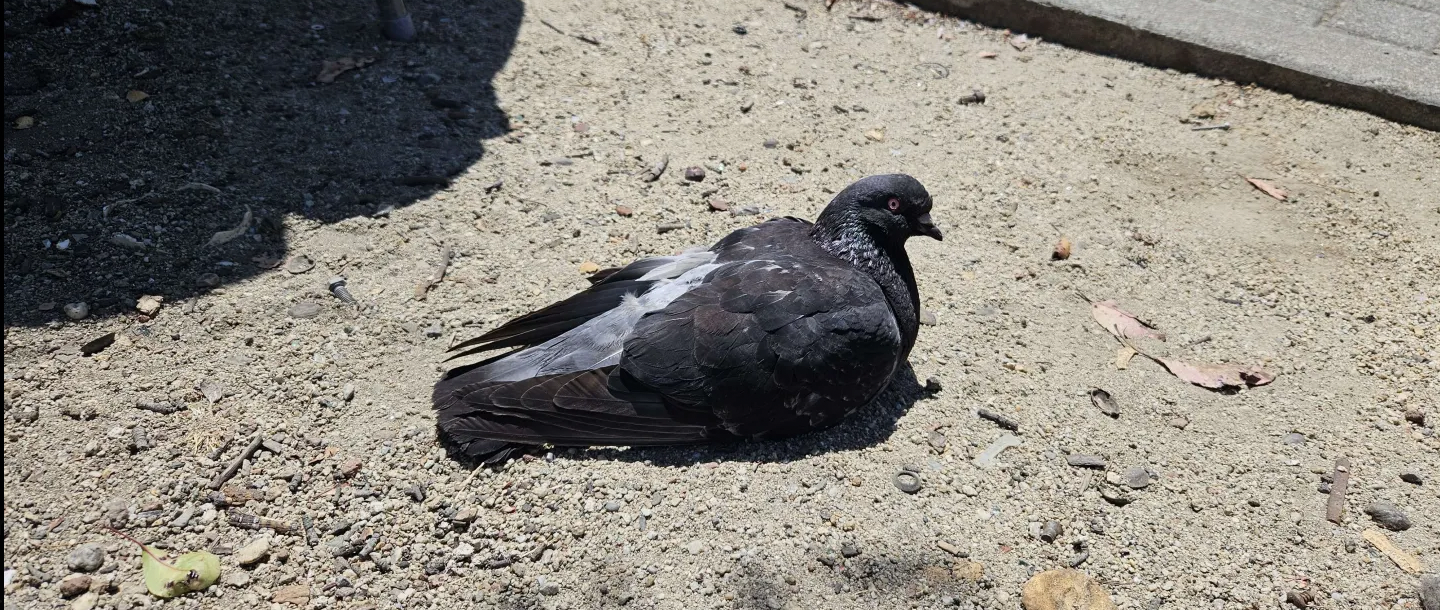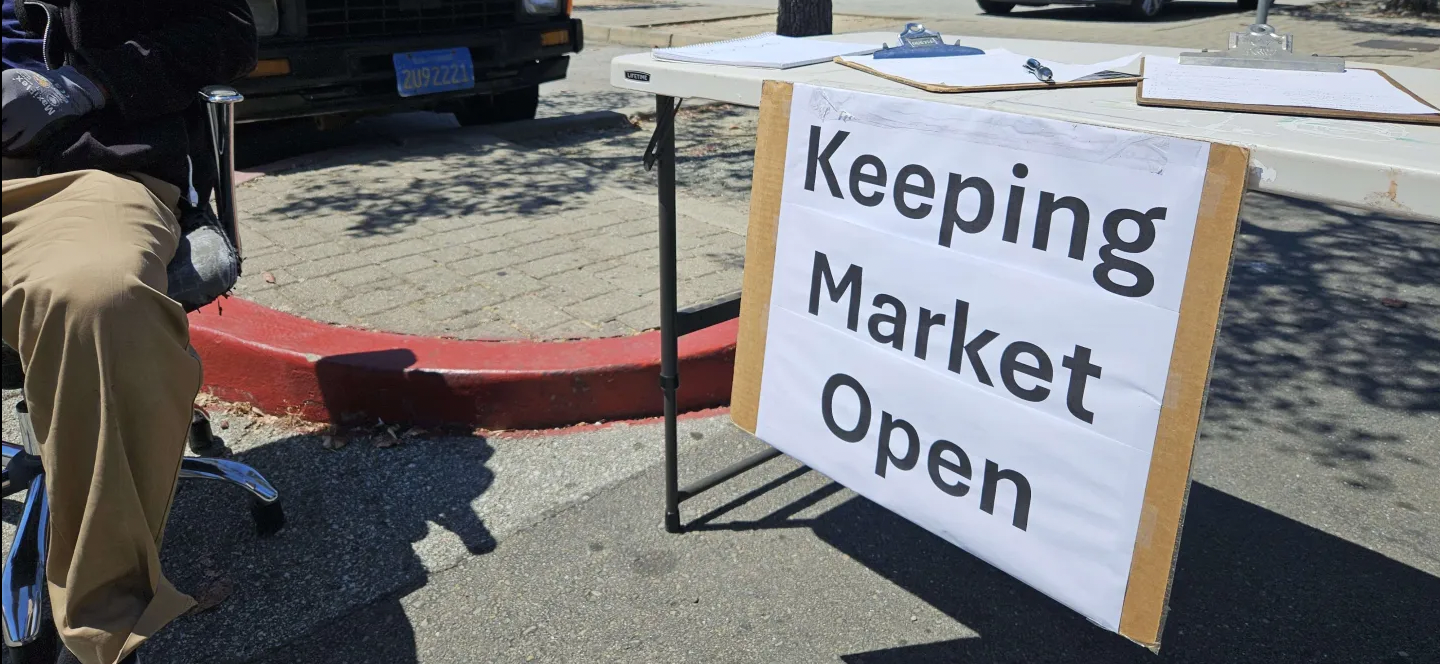Only a week ago, I was mourning the Berkeley Flea Market: after fifty years, the weekend staple in the Ashby BART station parking lot was closing for good. The non-profit that organizes the souk each weekend claimed it’s been hemorrhaging money since the pandemic, and so they sponsored the last official market day last Saturday. And yet here I am, the following Sunday, buying an impossibly cheap bootleg copy of Shrek 2 from one of the dozen or so merchants who are inexplicably operating as usual.
I approached a table with the large sign reading “Keeping Market Open” in hope of answers, where a charismatic man in a tie-dye heart shirt explained that the most die-hard members of the community collectively decided to keep showing up every weekend, with or without formal approval. BART officials are apparently aware and not interfering, at least for now. The man, whose name is Chris, is not a vendor but one of the regular musicians in the drum circle that coincides with the event every week. That drum circle is how I first discovered the market over fifteen years ago, following the echoing sound of percussion through the streets of Berkeley as a teenage college student. Back then, the circle was massive, with twenty-five or more skilled (and also unskilled) drummers hammering out ad-libbed polyrhythms at a time, which could be heard throughout much of South Berkeley and even North Oakland. Today only three drummers were left, but they played with the same intensity, matching and amending the beat of an E-40 song playing from a stereo at a nearby shop.
I’ve always been drawn to the flea market for conversation, which comes easy and free, with or without a purchase. When I used to come here to try and find cheap copies of the books I needed for class, an affable white bookseller spotted me flipping through a bell hooks volume. He told me that bell hooks took him in as a lover for two semesters when he was a grad student at UC Santa Cruz, one of a series of white boys she liked to date seasonally, like Susan Sarandon in Bull Durham but without the minor league baseball. Happy for the chance to brag and pleased that I didn’t react openly negatively to his dubious TMI, he gave me the book for free. Conversation is part of the exchange; I was being paid for a service rendered.
The atmosphere varied from booth to booth, but every vendor I spoke to was frustrated (if not furious) with the nonprofit’s managers, who many accused of financial mismanagement and reneging on their promise to continue operating through the end of the year. Our exchanges are friendly and full of laughter, but when I ask about The Situation they don’t mince words. “They used to like to walk over from their office [across the street] and lecture at us about good business practices,” one vendor said, indignantly, “but for the past year they’ve just sat in there. They don’t bother to walk over here anymore.” I listen sympathetically and hand him my last three dollars, just enough for a Nancy Drew paperback.

“We don’t need them!” insists another vendor, Ivy, who runs a large sunglasses booth. I’ve been buying unreasonably cheap shades from Ivy for a decade (though she’s been selling here for twenty-five years!), and because I reliably lose my sunglasses once a month, I can sincerely credit her with saving me from financial ruin and/or retinal damage. Years ago, I saw some asshole on Nextdoor accuse her of stealing her merchandise from local Walgreens. I do not remember my reply, but it was acerbic enough to get me banned from the site. Today she seems hopeful (if uncertain) about the future; while the cancellation notices led to a major drop in customer turnout, she hopes that her customers will return as word of mouth spreads news of the bazaar’s survival as an informal institution.
She isn’t necessarily being naïve. The market originally started as an unpermitted gathering back in the 1970s, and quickly became a central cultural hub in Berkeley’s largest African American neighborhood. The Pan-Africanist fashions and politics that coalesced in the 70s are still easy to spot here today in both the drum circle and the merchandise. But the Ashby BART area has also gentrified considerably since then, and many local cultural institutions have struggled; for example, the nearby Black Repertory Theater perpetually struggles to remain in their building. Against this backdrop, the refusal of the market’s community members (who are disproportionately Black or East Asian immigrants) feels all the more palpable.
Not everyone is here to talk politics. I hand nine dollars to a vendor named Derrick (or maybe Derek? We got caught up talking about Enya and I forgot to ask him how to spell his name) in exchange for nine CDs (including three Enya albums, a rarish one from Etta James, and my white whale, NOW 13). He chats about music with his friend, another vendor named Bernadette. He’s been selling here for twenty-eight years; she’s been selling for thirty. He is thrilled by my purchase, which more than doubled his daily sales. He introduces me to a pigeon nestled into a poof next to his chair. Its wings and feet seem injured, he says, and he has taken it upon himself to protect it for the rest of the day. Bernadette feeds it some birdseed she apparently keeps around for such occasions. Derrick sadly notes that the bird will probably be eaten by rats or a raccoon overnight, and says he regrets that he can’t do much about it. I say that it’s nice that, thanks to him, the bird can experience one more day, especially on a day as beautiful as this. Derrick agrees, smiling wide.
Leaving the lot, I pass the drum circle where a woman with pink hair is dancing spasmodically to a James Brown number, the pungent hot dog cart. A man walking out of the station turns to a BART security guard in bemused excitement. “Oh, I thought this got shut down.” She shakes her head and shrugs. “Nope. They aren’t going anywhere.”

